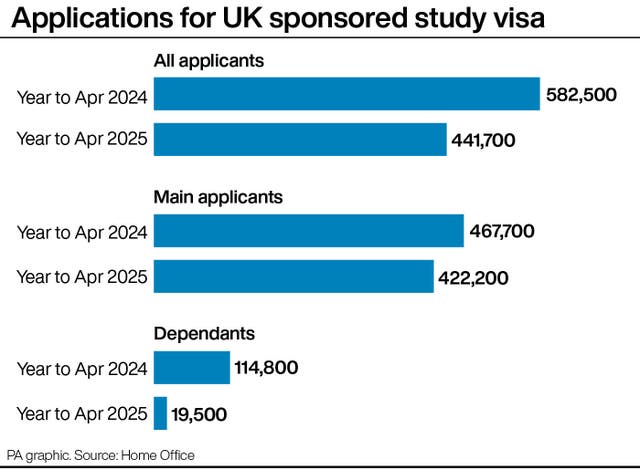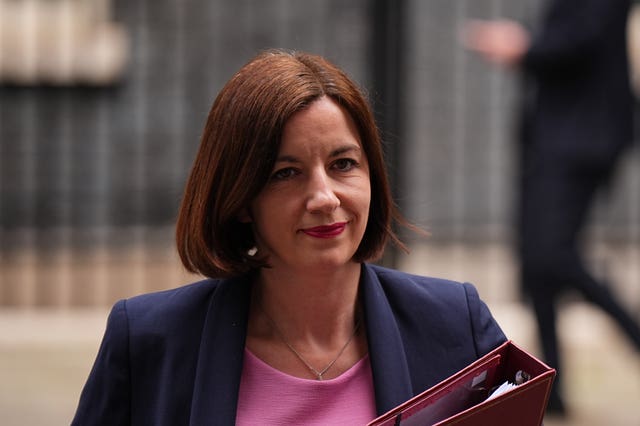More than two in five universities in England face deficits this year – watchdog
Higher education institutions have announced redundancies and course closures over the past year as a result of growing financial pressures.

More than two in five universities and colleges in England are expecting to be in deficit this year, an analysis by the higher education regulator has found.
The deterioration in financial performance for the universities sector is likely to continue unless reform is taken, the Office for Students (OfS) has warned.
The higher education regulator said it is making preparations for any possible closures of institutions in the future to protect students.

The watchdog’s annual health check said 43% of higher education providers in England face a deficit in 2024/25, compared to 40% of institutions who were expecting to be in deficit in 2023/24.
The OfS analysis said the primary reason for the decline is a fall in international student recruitment, and estimated that overseas student numbers could be more than a fifth lower than previous forecasts.
University leaders have been warning of significant financial concerns caused by a drop in the number of overseas students – who can be charged higher tuition fees – following restrictions introduced by the former Conservative government, as well as frozen tuition fees paid by domestic students.
A number of institutions across the UK have announced redundancies and course closures over the past year as a result of growing financial pressures.
Philippa Pickford, director of regulation at the OfS, told the media at a briefing: “We’re not expecting short-term university failures, certainly of a large institution, but it is something that we are preparing for and making sure that we’ve got processes in place to manage.”
She said the OfS is working closely with a small number of institutions where they are “concerned about their financial viability” to think about what needs to be put in place to protect students if they were to fail.
Ms Pickford added: “There is no doubt that if it was a large institution that fails, our ability to secure good outcomes for students is quite low, and that’s why we think it’s really important to have some sort of special administration regime in place for higher education.
“I know that’s something that we’re talking to Government about at the moment.”
Some universities are predicting a strengthened financial performance in the longer term, but the OfS has warned that forecasts seem “too ambitious”.
“We are concerned that this expected recovery is based on overly ambitious figures for recruitment growth over this period: 26% growth in UK student entrants and 19.5% growth in international student entrants,” the report said.
Ms Pickford said: “The sector is forecasting a third consecutive year of decline in financial performance, with more than four in 10 institutions expecting a deficit this year.
“We still do not expect to see multiple university closures in the short-term. But the medium-term pressures are significant, complex and ongoing.
“While institutions are working hard to navigate this challenging situation, we remain concerned that predictions of future growth are often based on ambitious student recruitment that cannot be achieved for every institution.
“Our analysis shows that if the number of student entrants is lower than forecast in the coming years, the sector’s financial performance could continue to deteriorate, leaving more institutions facing significant financial challenges.”
Since January 2024, international students in the UK have been banned from bringing dependants with them, apart from some postgraduate research courses or courses with government-funded scholarships.

The OfS report said international student entrant numbers are projected to be 21% lower than last year’s forecasts.
Separate figures, released by the Home Office on Thursday, showed that study visa applications were down 24% in the year to April 2025 compared with the previous 12 months, from 582,500 to 441,700.
The fall has been driven by a steep drop in the number of applications that cover dependants (down 83%) with only a small drop in the number of main applicants (down 10%).
On Wednesday, a group of cross-party MPs warned that serious challenges facing the universities sector present a “grave risk” to the financial viability of some institutions and courses if left unchecked.
The Education Select Committee has written to Education Secretary Bridget Phillipson calling on her to set out what the Government would do if one or more universities “cease to be able to operate”.
It came after a Universities UK (UUK) poll suggested that almost half of institutions have been forced to close courses for students to reduce costs.
In November, Ms Phillipson announced that undergraduate tuition fees in England, which had been frozen at £9,250 since 2017, would rise to £9,535 from 2025/26 to “secure the future of higher education”.
Vivienne Stern, chief executive of UUK, called the report “deeply sobering”.
She said: “Falling per-student funding, visa changes which have decreased international enrolments, and a longstanding failure of research grants to cover costs have been creating huge pressures in all four nations of the UK which are now reaching breaking point.
“We know universities are doing everything they can at an individual level to manage costs, and our Efficiency and Transformation Taskforce is supporting efforts to unlock greater efficiencies through further collaborative working.
“But the scale of the challenge means none of this will be enough without Government on the pitch too.
“To protect our world-leading sector and the jobs, growth and opportunity it provides, we need increased per student funding; stable international student visa policy; and to protect the research funding system.”
The Government is due to set out its plan for higher education reform in the summer.
Jo Grady, general secretary of the University and College Union (UCU), said: “Today’s data confirms UK universities remain under severe financial stress.
“The Home Office must now think again and pull any further attacks on international students from its immigration white paper.
“If Labour instead chooses to act like Reform-light and erect more barriers to those wanting to study here, there is a danger universities could go under.
“Over 10,000 jobs are already set to disappear from the sector as vice-chancellors attempt to bin courses and cut student provision to the bone.”
Education Secretary Bridget Phillipson said: “These concerning figures are further evidence demonstrating why the increase to tuition fees and the package of reforms I announced last year were necessary.
“The dire situation we inherited has meant this government must take tough decisions to put universities on a firmer financial footing, so they can deliver more opportunity for students and growth for our economy through our Plan for Change.
“I asked the Office for Students to refocus their efforts on monitoring financial sustainability last year. Further reforms are needed to fix the foundations of higher education, and universities must do more to make their finances work.”





